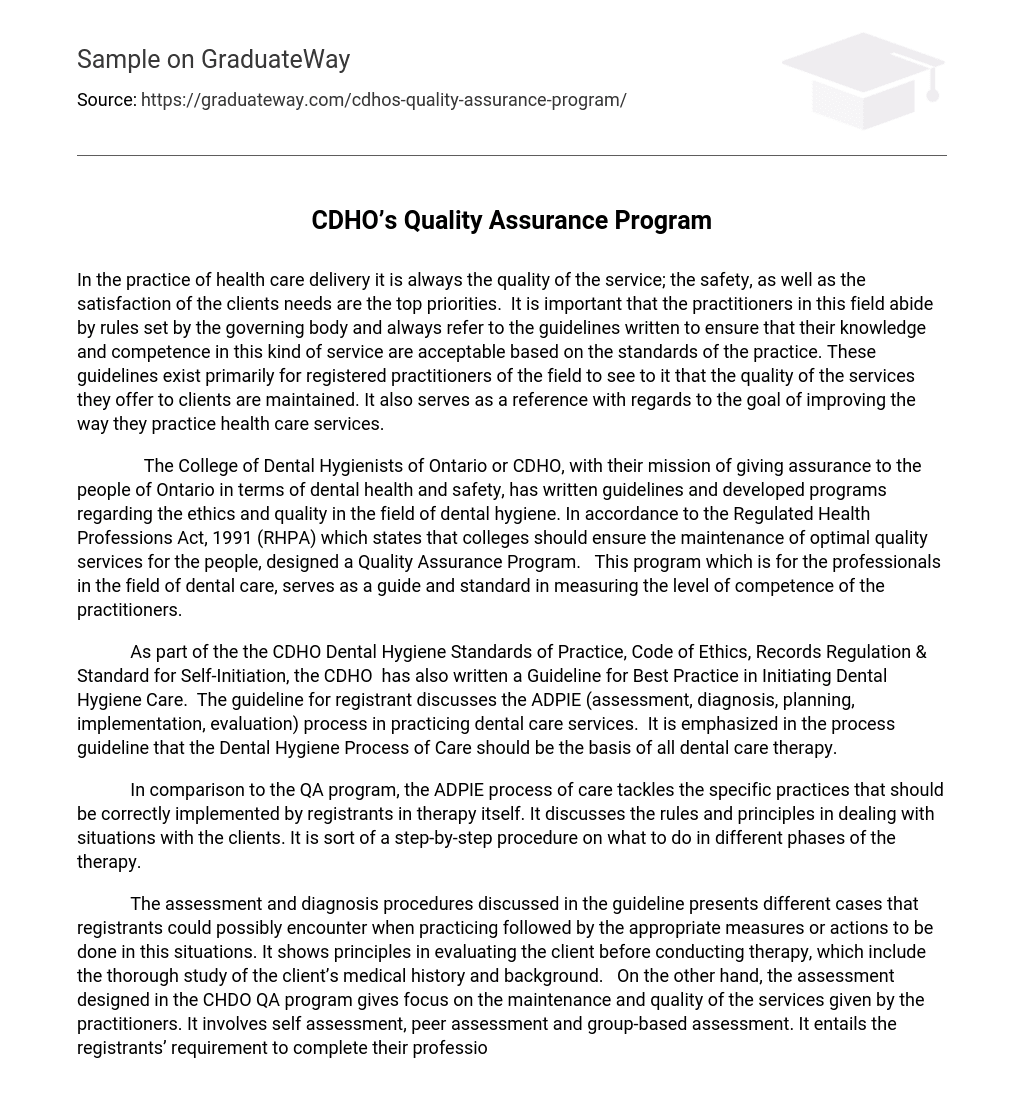In the practice of healthcare delivery, quality service, safety, and client satisfaction are always top priorities. It is crucial for practitioners in this field to abide by rules set by governing bodies and refer to guidelines to ensure their knowledge and competence meet acceptable standards. These guidelines primarily exist for registered practitioners to maintain the quality of services offered to clients and improve healthcare practices.
The College of Dental Hygienists of Ontario, also known as CDHO, has a mission to ensure dental health and safety for the people of Ontario. To achieve this goal, CDHO has developed guidelines and programs that focus on ethics and quality in the field of dental hygiene. In compliance with the Regulated Health Professions Act, 1991 (RHPA), which mandates colleges to maintain optimal quality services for the people, CDHO designed a Quality Assurance Program. This program serves as a guide and standard for dental care professionals to measure their level of competence.
As part of the CDHO Dental Hygiene Standards of Practice, Code of Ethics, Records Regulation & Standard for Self-Initiation, the CDHO has also written a Guideline for Best Practice in Initiating Dental Hygiene Care. The guideline discusses the ADPIE (assessment, diagnosis, planning, implementation, evaluation) process for practicing dental care services. It emphasizes that the Dental Hygiene Process of Care should be the basis for all dental care therapy.
The ADPIE process of care focuses on the specific practices that registrants in therapy should correctly implement, in contrast to the QA program. It outlines rules and principles for dealing with clients and provides a step-by-step procedure for different phases of therapy.
The assessment and diagnosis procedures discussed in the guideline present different cases that registrants could possibly encounter when practicing, followed by the appropriate measures or actions to be taken in these situations. The guideline shows principles for evaluating the client before conducting therapy, which includes a thorough study of the client’s medical history and background.
On the other hand, the assessment designed in the CHDO QA program focuses on maintaining and improving the quality of services provided by practitioners. It involves self-assessment, peer assessment, and group-based assessment. Registrants are required to complete their professional portfolios, 10% of which will be reviewed by the QA panel as part of peer assessment process. CHDO also assesses nature and quality of practice through periodically collecting and analyzing information.
Other procedures involved in the CHDO best practice guideline include developing an individual treatment plan for clients, implementing and ensuring that dental hygiene treatment is in accordance with the plan formulated with the clients, and evaluating oral health progress of clients. Re-assessment and review of the treatment plan are also necessary.
The QA program assesses performance but also involves other components such as measures to address behavior or remarks of a sexual nature. This deals with allegations of sexual abuse without physical contact. Other components of the QA program relate to the ADPIE process of care but do not deal with the treatment process itself. Rather, they focus on improving practitioners’ performance quality.
The criteria for determining quality dental hygiene treatment procedures are contained in the CDHO Dental Hygiene Standards of Practice. In compliance with these standards, the QA program requires dental hygienists who have deficiencies in knowledge, skills, attitude or judgment to participate in practice enhancement/remediation activities.
References:
The College of Dental Hygienists of Ontario Quality Assurance Program (2006) published a journal that can be retrieved from www.cdho.org.





